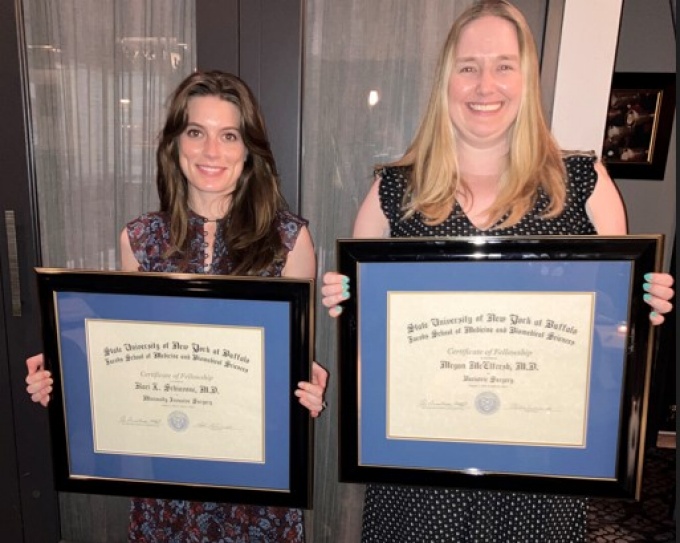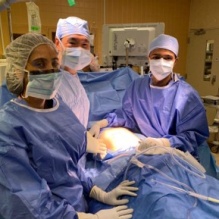Bariatric Surgery Fellowship

2023-2024 Fellows, Kaci Schiavone, MD (MIS fellow-left) and Megan McElfresh, MD (Bariatric fellow-right) at the 2024 fellowship graduation dinner.
The University at Buffalo Department of Surgery is excited to announce that as of May 2024, our Bariatric Fellowship received an accreditation status with the Fellowship Council.
Educational Curriculum
The University at Buffalo Bariatric Fellowship provides exclusively and predominantly bariatric surgical training. The fellow is exposed to a variety of surgical experiences and many advanced procedures. The clinical experience is gained through progressive responsibility and increased autonomy over the course of the one-year fellowship.

Residents in OR
We aim to train individuals who are committed to not only advancing their surgical skills and knowledge, but who are committed to providing exemplary care to the patients of Buffalo.
The fellowship follows the national Bariatric Surgery curriculum set forth by the Fellowship Council. In addition to the objectives provided by the Fellowship Council, elements unique to our UB fellowship include:
- train the fellow in robotic surgery
- train the fellow in endoscopic bariatric procedures
- provide a dedicated teaching experience in which the fellow educates other learners
- incorporate a research experience which can be presented at SAGES
At the conclusion of the fellowship in bariatric surgery, the fellow will be able to provide comprehensive, state-of-the-art medical and surgical care to patients with morbid obesity and obesity related diseases. This will include the ability to investigate, diagnose, recommend therapeutic options, perform operative procedures and provide all aspects of care, including pre-operative, peri-operative and late postoperative care. To achieve this goal, this curriculum provides a guide to the topics for study, and the knowledge and skills required to become a bariatric surgeon.
The goals of the UB Bariatric Surgery Fellowship are to train the fellow to:
- understand the fundamentals of bariatric surgery
- understand obesity and obesity associated co-morbiditie
- understand the importance of a multidisciplinary approach to optimize and manage bariatric patients pre and postoperatively
- learn how to establish a comprehensive weight loss program
- understand the surgical options, endoscopic procedures and medications available to treat obesity
- develop skills to perform primary and revisional bariatric surgery as well as other advanced laparoscopic/robotic procedures
- develop skills in diagnostic and therapeutic endoscopy to manage bariatric patients
- learn to perform and interpret manometry and pH studies
- understand how to manage postoperative complications, weight regain and reflux after bariatric surgery
- incorporate research that can be presented at SAGES and ASMBS annual conferences
Clinical Experience & Schedule
Fellows will be responsible for continuity of care, including pre and post‑hospital experience. Chief residents will not be assigned to the same service as the fellow.
Majority of the fellow’s time will be spent at Erie County Medical Center (ECMC) on the Bariatric Surgery service with our core faculty. Also, at ECMC, the fellow has opportunities to join advanced hernia cases, foregut cases, ERCPs, manometry procedures and others at the request of the fellow.
The fellow has the opportunity to rotate at the Millard Fillmore Suburban Hospital (MFSH) where they can gain exposure to manometry, pH studying, ERCP, robotics, hernia repair and others. Time spent at MFSH will be determined based on the current fellow’s needs and interests. Site Director, Eleanor Fung, MD, alerts the fellow to appropriate learning opportunities/cases that arise at MFSH which will not conflict with resident cases/teams.
Endoscopy Experience:
- fellow goes to SAGES Endoscopy course
- participate in POEMs, GPOEMs, and ERCPs at MFSH
- participate in ERCPs at ECMC
- participate in diagnostic and therapeutic endoscopies at ECMC
Below is a sample of a typical monthly schedule for the fellow:
| Monday | Tuesday | Wednesday | Thursday | Friday |
|---|---|---|---|---|
| Bariatric Clinic | OR ECMC/Adv Endo MFSH | Bariatric Clinic | OR ECMC | Bariatric Clinic/ Endoscopy ECMC |
| Endoscopy ECMC | OR ECMC | Bariatric Clinic | OR ECMC | Bariatric Clinic |
Bariatric Clinic | OR ECMC | Bariatric Clinic | OR ECMC | Bariatric Clinic/ Endoscopy ECMC |
| Endoscopy ECMC | OR ECMC/Adv Endo MFSH | Bariatric Clinic | OR ECMC | Bariatric Clinic |
Case Volume & Variety
Upon graduation, fellows will have completed the minimum number of cases required to allow for “certification” as a bariatric surgeon.
ASMBS Guidelines for Case Volume
- Minimum of 100 cases
- 51 cases must be as primary surgeon and include restrictive and malabsorptive procedures
- 50 cases must include an anastomosis (eg: RNY gastric bypass)
- 10 restrictive cases (eg: sleeve gastrectomy)
- 5 revisional procedures
- 35 undesignated cases that may also include
- Internal hernias
- Lap band removals
- A simple port change does not count toward the 100 case min
- 80% of the primary bariatric surgeries must be performed using minimally invasive techniques (laparoscopic/robotic)
- Fellows must have demonstrable experience in the preoperative evaluation and assessment as well as postoperative follow-up and assessment of patients.
Scholarly Activity & Didactics
- weekly ECMC M&M Conference (Tuesdays, 7:00am)
- weekly Department of Surgery Grand Rounds (Thursdays, 6:45am)
- quarterly attendance at Bariatric QAPI meeting
- quarterly journal club
- participation in MBSAQIP quality improvement projects (2 annually)
- participation in ASMBS Leadership Academy
- attendance at national meetings: SAGES and ASMBS
- attend SAGES Endoscopy Course for Fellows
- present at Department of Surgery Grand Rounds
- submit an original manuscript for publication
- opportunity to attend educational seminars deemed appropriate by the program director, including but not limited to: courses sponsored by SAGES, Fellows course hosted by Intuitive Surgical, Annual MIS & Bariatric Fellows course hosted by Cleveland Clinic, MIS Fellows courses hosted by J&J, Bariatric Course, etc.
Contact
Program Director

Erie County Medical Center Buffalo, NY 14215
Phone: 716-565-3990; Fax: 716-565-3988
Email: cs328@buffalo.edu
Associate Program Director

Buffalo General Medical Center Department of Surgery 100 High Street Buffalo, NY 14203
Phone: 716-859-3196; Fax: 716-859-2737
Email: arposner@buffalo.edu
Training Program Administrator
Sydney Ruger, M.Ed
Surgical Fellowship Administrator
Department of Surgery
Buffalo General Medical Center, 100 High Street, Buffalo, NY 14203
Phone: 716-859-4207
Email: slrojek@buffalo.edu